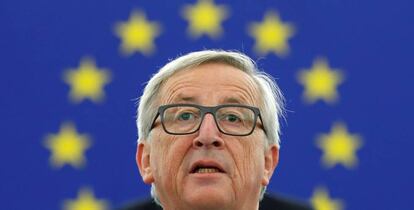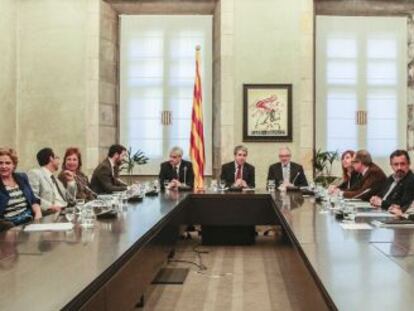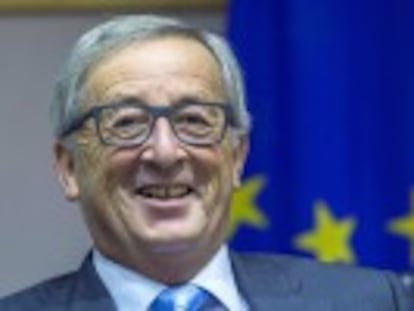Juncker: “Europe is not ruled by the law of the strong”
Spanish European deputies urge Commission to take action on Catalonia, but are themselves ideologically divided

The Catalan crisis crept into the State of the European Union address on Wednesday, when several Spanish Members of the European Parliament (MEPs) – and even a Belgian one – asked Brussels for action.
But the demands varied depending on each MEP’s political affinity. Pro-independence groups asked the European Commission to act as a mediator with the Spanish government to defend Catalonia’s “freedom of speech.” Meanwhile, members of the Popular Party (PP) and the Socialist Party (PSOE) thanked Commission President Jean-Claude Juncker for an address that defended “the rule of law” as the cornerstone of the European Union.
In Europe, the strength of the law replaced the law of the strong
EC President Jean-Claude Juncker
Juncker defended the strength of the law in a lengthy address analyzing the steps that Europe must take in the coming years to become stronger and more united.
“In Europe, the strength of the law replaced the law of the strong,” he said.
“The rule of law is not optional in the European Union. It is a must,” he added. “The judgments of the European Court of Justice have to be respected by all. To undermine them, or to undermine the independence of national courts, is to strip citizens of their fundamental rights.”
Although Juncker was alluding to violations of EU law by some Eastern European countries, notably Poland and Hungary, some Spanish representatives took it to also mean Catalonia, where authorities are planning to hold an independence referendum that the Spanish courts have ruled illegal.
Sources who work closely with the EC leader denied that Juncker was alluding directly to Catalonia, but admitted that it is possible to make that interpretation, and said that the rules are the same for everyone.
Disobeying court rulings is not defending democracy and it is not freedom of speech
Juan Fernando López Aguilar, Socialist EMP
“Nationalism is contagious and it spreads like a virus,” said Esteban González Pons, the PP spokesman in the European parliament. “The constitution of each member state is also the EU’s constitution, and the European Commission has a responsibility to defend it.”
The Socialist representative Iratxe García Pérez thanked Juncker for his references to the rule of law. “Europe is a democratic project, and it is essential to guarantee respect for constitutional rules,” she said.
Her colleague Juan Fernando López Aguilar added that “disobeying court rulings is not defending democracy and it is not freedom of speech. It is a violation of the law, a crime, the denial of Europe.”
But Josep Maria Terricabras, a deputy for the Catalan pro-independence party Esquerra Republicana (ERC) asked Juncker “to mediate with the government of Spain in favor of an agreement about the referendum.”
“Why doesn’t the European Commission intervene to defend freedom of speech in Spain? It would in other countries,” he added.
This argument was supported by a eurodeputy from Belgium, Mark Demesmaeker of the N-VA, a nationalist party from Flanders.
So far, Brussels has said next to nothing about this issue, as it feels that it is up to Spanish authorities to apply the law. But Juncker has stated in writing that any territory that splits from a member state will automatically leave the EU as well.
English version by Susana Urra.









































